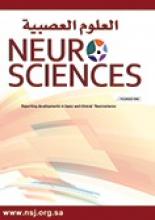Abstract
OBJECTIVE: During Ramadan, adult Muslims stop eating and drinking during the daytime. Fasting may cause physiological habitual and behavioral changes that may cause an increase in the rate of road traffic accidents (RTA) during Ramadan. The aim of this study was to see whether there is a real increase in the rate and severity of patients treated secondary to RTA during Ramadan.
METHODS: We enrolled all patients treated secondary to RTA in the Accident and Emergency Department of Princess Basma Teaching Hospital, Irbid, Jordan, during the period October 1st to November 30th 2004 in the study. The Ramadan period was between October 15th and November 13th; we took the rest of the period as a control period. We noted the number of patients, severity of injuries and rate of admission to hospital as well as distribution of the cases according to the time of the day.
RESULTS: We treated 228 patients during the 2 months; 96 during Ramadan and 132 during the control period, significantly less during Ramadan (p-value = 0.004). There were no significant differences between the numbers and severity of injuries among the subgroups of patients in relation to time of the day or the weekdays.
CONCLUSION: The religious and spiritual atmosphere that embraces fasting people during the holy month of Ramadan causes neutralization of the adverse affects of increased nervousness and high temper of the fasting people. Thus resulting in a decrease rather than an increase in the rate of RTA.
- Copyright: © Neurosciences
Neurosciences is an Open Access journal and articles published are distributed under the terms of the Creative Commons Attribution-NonCommercial License (CC BY-NC). Readers may copy, distribute, and display the work for non-commercial purposes with the proper citation of the original work.






